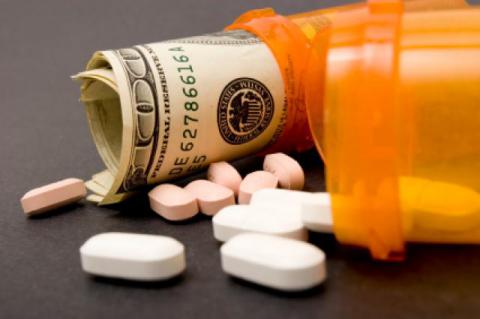Rx for Change — Binge-Eating Disorder: Another Invented Disease Brought to You by Pharma
Ever notice how dinner party hosts estimate portions based on their own appetites? Small eaters may leave their guests hungry; large eaters may have plenty of leftovers. Adriane’s in the latter category; her guests learn to enjoy her food in generous portions, or risk her wrath. Charlea, on the other hand, considers salad dinner. Somehow, we’ve managed to remain friends.
Sadly, Adriane’s hearty appetite may indicate she has a new disease: binge-eating disorder. We learned this through a disease awareness campaign, which publicizes a disease without mentioning specific drugs. These campaigns are often used when there’s only one drug to treat a disease; the process is simplified when the company invented the disease to begin with!
Drug manufacturer Shire created “binge-eating disorder” to promote several amphetamine drugs, including Adderall (mixed amphetamine salts) and Vyvanse (lis-dexanfetamine mesylate). According to BingeEatingDisorder.com (which doesn’t mention drugs or Shire):
- Symptoms include “regularly eating far more food than most people would in a similar time period under similar circumstances.” Check!
- And, “Feeling that one’s eating is out of control during a binge. The feeling of not being in control can be either the inability to keep from starting to eat or the inabilty [sic] to stop eating once a binge eating episode has begun.” Check! (When they say, “the inability to keep from starting to eat…” we wonder, before a meal…when one is hungry?)
- “To qualify as ‘regular binge eating,’ the instances must take place at least once per week for three months.” Check! (Only once a week? How about three meals a day?)
- “The time period during which binge eating instances take place can vary by individual, but is generally considered to be less than two hours and does not have to be in one setting.” Check! (We think they mean “one sitting,” but most meals last less than two hours anyway.)
We hope no one thinks being hungrier than one’s friends is a medical condition. As Julie Holland (author of Moody Bitches, about how pharmaceutical ads target women) says, “They have ads where they show a woman surrounded by pizza and hamburgers and donuts and it says, ‘If you eat more than you want to and feel guilty afterwards, you may have this disorder.’ Which is sort of like saying, “If you’re a woman, you have this.”1
In fact, binge-eating disorder only became a disease in 2013, when the American Psychiatric Association proclaimed it to be one. The new disease was likely created to extend the patent for Vyvanse (first approved for Attention Deficit and Hyperactivity Disorder [ADHD]), since approval for a new indication – even an invented one- confers additional years of patent protection.
In 2011, Shire stated that it intended to expand Vyvanse’s use for other conditions, including schizophrenia, depression, and binge-eating.2 In 2014, Shire agreed to pay $56.5 million to settle charges it over-promoted ADHD drugs (it allegedly said Vyvanse could help prevent car accidents, divorce, arrests, and unemployment).3 The fine is nothing compared to Shire’s profits. Vyvanse is a blockbuster drug that makes over $1 billion a year, and binge-eating disorder sales are expected to add $200-$300 million annually.4
Let’s be clear: binge eating can be a symptom of anxiety, stress, or low-self esteem. Binge eating is also part of bulimia, an eating disorder in which people binge and then purge by vomiting or using laxatives. (But “binge-eating disorder”, which is bulimia-minus-vomiting, is not a separate, real disease..) Binge eating is best and most successfully treated with therapy and support groups.5
Since binge eating can indicate a propensity for addictive behavior, treating it with an addictive drug is a bad idea. Yet, that’s just what is happening, because Vyvanse is essentially “speed.” Binge-eaters need therapy, and overweight people need diet and exercise. In any case, addicting patients to amphetamines is a bad idea.
Sure, speed causes weight loss, but the health risks aren’t worth it. Besides addiction, amphetamines like Vyvanse can cause strokes, heart attacks, death, psychotic symptoms, mania, anxiety, and insomnia.6 Since Vyvanse was approved in 2007, the FDA has received more than 130 reports linking it with suicide.7
It’s bad enough that a dangerous drug will be used to treat a widely promoted, made-up disease.8 It’s worse that this dangerous, addictive drug will be prescribed off-label to treat people who are overweight. Although the FDA expressly stated that Vyvanse was not approved for weight loss, clinicians are likely to prescribe it for that purpose.9 Since everyone has eaten “far more food than most people would in a similar time period under similar circumstances,” clinicians may well decide any overweight person qualifies for this bogus diagnosis and dangerous treatment.
The FDA really bolloxed its 2015 approval of Vyvanse for binge-eating disorder. It didn’t ask for outside review and even gave Vyvanse fast-track regulatory review, which should be reserved for important drugs for real diseases. Medicalizing normal human behavior or common symptoms, and renaming subsets or combinations of symptoms, are common strategies to sell drugs. The FDA needs to step up its game and protect the public from disease-mongering scams.
Charlea T. Massion, MD, is a NWHN Board member, family physician, and specialist in hospice and palliative care medicine. She is the Chief Medical Director of Hospice of Santa Cruz County and also teaches physicians about work-life balance and career development.
Adriane Fugh-Berman, MD, is an associate professor in the Georgetown University Medical Center; a former chair of the NWHN Board of Directors; and directorof PharmedOut, which educates prescribers about pharmaceutical marketing techniques.
References


Spread the word